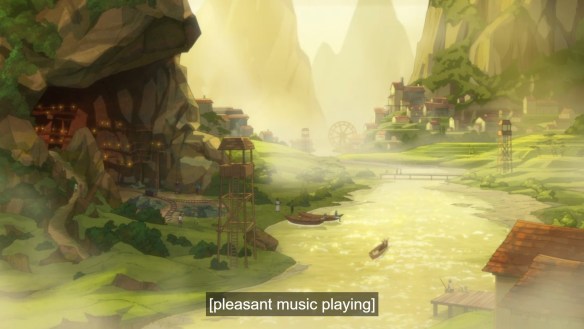Hello folks, and welcome back to Wrong Every Time. Today I’m delighted to be returning to the Legend of Vox Machina, touching down in a moment of crisis and calamity for our poor adventurers. Having just secured a platemail vestige for Pike and beaten a dragon in the bargain, they returned to Whitestone to see it bathed in fire, the sky alive with Thordak’s nightmare brood. This attack marked the end of their alliance with the devious Raishan, and the beginning of a new quest: killing that asshole Anna Ripley.
So basically, it seems like we’ve surmounted the third act finale of Mercer’s overall campaign structure, in keeping with the villain-slaying standard of the Whitestone and Thunder Herd act finales. DnD is an eternal compromise between player agency and narrative necessity; stories aren’t structured arbitrarily, their rise and falls of drama are paced so as to cultivate reader interest, offer moments of release, and ultimately reward the reader for their investment. As such, while DnD campaigns are often more freewheeling than your average fantasy novel, a skillful DM will still infuse them with the structural momentum of a traditional narrative, drawing rising action together into cathartic peaks, and then humbling the party before starting that rise over again.
Incidentally, my party’s own ongoing campaign has just reached a similar point, having recently defeated the vampire Strahd with some kind of holy hand grenade. We’re actually in a much trickier spot, as the self-contained nature of the Curse of Strahd campaign means we’re now left with no dangling threads to pursue, and essentially have to reinvent a reason why we’re even traveling together. I’m doing my best to make some player-side sense of our ramblings, but have to admit I’m becoming increasingly nostalgic for my days of DM-side campaign control, as the richness of a player character is in large part a reflection of how meaningfully they can interact with the DM’s world. Let’s enjoy Mercer and Percy showing exactly how that’s done as we return to Vox Machina!
Episode 7
We open on a fresh set of beautiful backgrounds, this time detailing an alpine village that seems divided between the farming of watery paddies and the mining of precious minerals. Apparently this is actually Ripley’s hometown, as we see a much younger Ripley fixing a minecart
These flashbacks are a great privilege of this adaptation; even if you had the DM simply convey this entire scene via exposition, it would possess little of the impact of literally seeing a young Ripley going about her business. I actually feel like it’s a good thing in DnD terms that I don’t learn particularly well via spoken words versus through images or text – because of that, I also never assume my players will care about a scene or character simply because I’ve described them. Investment in DnD must necessarily be forged through action, through drama in the present tense, through things the players can personally interact with
A group of mages known as The Assembly arrive to steal their mines. Thus Ripley’s motivation is firmly established: she must build weapons capable of contending with magic-users, so she will never feel this helpless again
Jumping back to the present, Percy has realized why Ripley revealed Whitestone’s location: to steal their supply of Residuum. I appreciate how Mercer is continuing to weave the consequences of Percy’s initial arc throughout this Chroma Conclave arc, maintaining a sense of continuity and consequence while also allaying the sensation of conflicts being entirely seasonal. I imagine that mysterious orb from the end of season one will eventually come back into play in some calamitous fashion as well
Percy states the rocks left in their vault can only be found on the isle of Glintshore. An appropriately conclusive response to what was presumably an excellent investigation check
Performing investigations in DnD is tricky precisely because “Investigation” is an actual skill in the skill list; if you want investigation to incorporate more interaction than just rolling that specific skill check, you have to flex a bit, either incorporating a need for multiple skill checks or progressive investigations (so, “you think you might recall this stone from a book” being the first success, then you actually have to find that book, etcetera)
Vex wisely notes that Ripley leaving this stone is essentially an invitation
“You said I’m a changed man. Let’s hope you’re right.” One of the best ways to convey player characters reaching a bonding threshold: trusting each other’s judgment over their own
Excellent beat of Percy and Vex fretting over revealing their relationship to the team, followed by the team lamenting how obvious those two are being. There’s plenty of fun, fertile drama in navigating romantic relationships between characters, and this phase is one of my favorites to actually write – the awkward adjustment period, when you’re both giddy about being a couple, but not actually sure how to act as a couple. I had an inordinate amount of fun writing that dynamic for my first novel, and have since indulged in it while writing non-player characters as often as possible
Of course, I also love the “attempts at greater sincerity/intimacy only invoke friction” preceding phase, exemplified by something like Toradora’s drama. Currently having a lot of fun writing through that phase with two of my other non-player characters
The team elect to fly to Glintshore, demonstrating the odd caravan of transport faculties that often define later-level parties. Between Vex’s broom, Vax’s wings, and Keyleth’s giant eagle form, they’ve got just enough flight capabilities to manage it
We watch ants carry leaves along a vine before the focus shifts behind them, tracking our heroes through the forest. I’ve actually been trying to improve my use of the DnD equivalent of “establishing shots” – the brief expository text that introduces a new scene or region. Pure descriptive copy tends to wash over me in speech, so I try to be brief yet evocative, drawing in as many senses as possible – what is the sound, smell, and texture of this place? It’s hard to craft atmosphere in DnD, but it’s well worth the trying
The next hour or so of Vax carefully poking at traps is mercifully summarized. Even if an area seems likely to have traps, making the players trap check everything generally just slows the game down, so I tend to limit my traps to however many achieve max comedy. A chest full of spring-loaded scorpions should be used sparingly
Percival admits he’s in love with Vex, and in classic Vex fashion, she freezes and then exits the scene. Vex’s insecurities are an excellent supplement to the overall party drama, provoking friction with Vax, Percy, and even Keyleth. For my party’s own current campaign, we’ve made a point of plotting out key areas of philosophical disagreement between our characters, such as to more gracefully promote drama and character growth. Player characters that agree on everything don’t tend to feel particularly distinct or memorable
Distracted by Percy’s confession, Vex trips right over a wire, and an entrancing smoke overwhelms the party
“Your love, it kills.” A brief flashback to Vex’s dead mother offers some context for her anxieties. You can theoretically create a player character without a meaningful backstory, but that naturally undercuts the sense that your character is on some sort of emotional journey, following an arc from where they began towards who they’ll become. We are built of our past experiences, and denying such experiences makes your character a cipher
Ripley introduces Percy to the factory while the rest of the party are paralyzed by “delirium gas.” A fine enough device for challenging their personal development, similarly to how the sphinx challenged them back in season two. For players who are actually invested in their characters’ emotional development, psychological gauntlets like this can be a chance to show off, to flex how far their avatars have come
And of course, Percy being tempted to the dark side by Ripley is just another variation on that same concept
“My imperfections don’t make me weaker. They make me who I am.” Well said, Percy. From what I’ve seen of their actual sessions, the Critical Role team are preposterously adept at coming up with a killer line or speech when the opportunity calls for it; I do what I can to plot out what I am able, but some talents you can only admire, not effectively imitate
“I will not be complicit.” “Progress cannot be stopped.” Percy and Ripley’s conflict is the most compelling within this story, as Ripley’s the only antagonist with an actual point – scientific progress will proceed, and in a world ruled by magic, attempting to fight back through science has a nice egalitarian ring to it. It’s the least gamified conflict in a campaign otherwise defined by seeking dragon balls to fight unquestionably evil dragons
“A library? Words, all words? Why are there no pictures!?” Bless Grog. Keeping a character or two simple does help the dramatic balance
Ooh, some nice smear-heavy cuts for Percy and Ripley’s duel
The moment of truth of course comes after his victory, when he must decide whether he is still the vengeful executioner, or if he can let this go
But though Percy has changed, Ripley has not. She greets his mercy with a gunshot
And Done
Well, that’s what you get for trying to redeem folks, I suppose. Nonetheless, even her refusal to accept Percy’s offer here further bolsters Anna Ripley’s position as the most compelling non-player character in this campaign, a character with perfectly understandable motivation who has been drawn into a violent, antagonistic role through her unflinching faith in her convictions. Seeing her cross both words and weapons with Percy has me feeling eager to craft such similarly compelling antagonists for my own campaign; I’ve likely been too generous in terms of character redemption in the past, and could probably stand to add a character or two the party can’t quite rehabilitate. It’s a good Vox Machina episode that leaves me so eager to steal something!
This article was made possible by reader support. Thank you all for all that you do.




